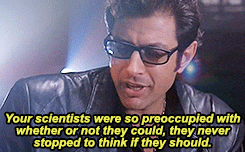Maybe Bigger Isn't Better?
The demise of Gimlet Media seems as good a time as any to talk about why the logic of Wall Street is a terrible way to run a business.
On June 8,
opened the latest edition of her newsletter, , with the header RIP Gimlet. She continued:I’m heartbroken over the news that Spotify has laid off another 200 podcast employees, though I’m not shocked.
I wasn’t shocked, either. But it was a punch in the gut.
I devoured Alex Blumberg's Startup when it first came out, which was about a year before I started podcasting. Then, I inhaled Reply All when it launched, and despite its later troubles, was genuinely moved by its final episode. I lapped up Blumberg's earnest interviews with entrepreneurs on Without Fail.
I even had the privilege of interviewing Blumberg during a course I taught at CreativeLive.
I followed Gimlet's acquisition by Spotify with interest (and a healthy dose of skepticism).
The bumpy ride that they've had since then was utterly predictable. Though, like Pillsbury, I find the news that Gimlet is no more—at least in any recognizable sense—quite upsetting.
Despite my interest in Blumberg's vision and Gimlet's rise to podcasting power, I have always wondered something that people asked Blumberg multiple times in Season 1 of Startup:
Why go the venture capital route? Why not build out a studio organically?
At the time, I think I was invested enough (pun intended) in the underdog story that I didn't think much about Blumberg's answer. My vague recollection was that his answer was never very well thought out (I'd double-check, but it seems there are no transcripts for Startup—WTF?!). Even though I was rooting for Blumberg and his vision, the impression I got was something along the lines of:
Building a big company seems like the thing to do? There's a lot of money flowing around, and I'd like to make podcasts with it? I think this could be really big?
I mean, honestly, it was 2014—he wasn't wrong. Building a big company was the thing to do. There was a lot of money flowing around and funding things far less interesting than a major podcast studio. It could be really big!
But none of those are very good reasons for taking millions of dollars of other people's money.
It's like Dr. Ian Malcolm said:
Your
scientistspodcasters were so preoccupied with whether or not they could that they didn't stop to think if they should.
Anyhow, as different waves of mergers, acquisitions, and layoffs have hit the big podcast studios, legacy media always asks, "What does this mean for the podcasting industry?!" The assumption is that if the big studios can't make it, maybe the whole of podcasting is doomed.
New York Times reporter Reggie Ugwu details the "chilling" climate of the podcast industry in a February article. He cites layoffs, tightened ad budgets, and cancellation of big-name deals, like Spotify's contracts with Barack and Michelle Obama and Bruce Springsteen and SiriusXM's deal with James Van Der Beek. And the article includes this telling quote:
“The dumb money era is over,” said Eric Nuzum, a podcast strategist and co-founder of the independent studio Magnificent Noise. “People had been throwing money at things just to see if they could get in and scale up audience quickly, but now everyone’s being a little bit more conservative.”
Nuzum actually gets the last word in the article—saying that overall podcast audience growth is a sign of health, and the business side will sort itself out.
What will it take for the business side to sort itself out?
It'll take a different playbook. One that's already been used successfully many times.
In a May article, Ugwu profiles the podcast and multimedia studio Tenderfoot TV. This studio is growing—not shrinking. How? Well, the two founders still own the company outright, and the staff, which doubled in the last year, is still fewer than 20 employees.
Similarly, Crooked Media, the studio behind Pod Save America, had been entirely self-funded and owned by its three founders from January 2017 until September 2022. It was then that Crooked finally took on a round of outside funding—in the perfect subtweet of conservative media—from Soros Fund Management. But the three original founders maintain a majority stake in the company, according to Variety.
These are huge and unusual success stories. But podcasting is full of small success stories, too. People make all kinds of shows and fund them in all sorts of ways without taking on the burdens of making corporate or shareholder overlords happy.
From inside the world of podcasting, the consensus on podcasting's "troubles" seems to be that we're sorry to see shows we love end, sad to see our role models lose their jobs, and angry about how the whole thing often goes down. But, we're also screaming into the void:
"We're still here! We'll always be here!"
In the discourse around business and entrepreneurship, you get the impression that, with "bigger," you get the chance to do "better." More money equals more opportunities for creativity. More staff translates to more experiments. More support leads to higher quality. And as all of that comes to fruition, the business will do well. It has to, right?
But no, it doesn't have to.
In fact, I would argue with the whole premise.
Bigger can mean being strapped with must-hit metrics, dozens of other people's opinions, and the crushing responsibility of all the livelihoods you've tied to your shot at success. Bigger breeds conformity and homogeneity, not creativity and experimentation.
I believe that podcasting is an industry that will be around long after the foreseeable future becomes the present. I believe that podcasts are, without a doubt, commercially viable cultural products. I believe that the best is yet to come in podcasting.
I believe that studios can grow into sustainable and healthy businesses that pay their staffs well and do well by their founders.
I just don't believe that the financials will ever make podcast studios compatible with the growth and profit expectations of the world of investment. And I think that's a good thing.
I was talking to a friend about my last piece, and they made the point that there is a particular kind of creator economy business that operates on a rationale of value extraction. They purport to create value—through education, media, software, etc.—but value creation isn't the logic of the business.
Instead, the business is making its play for a certain piece of the pie.
The logic of extraction demands that business operations focus on squeezing money out of a project in any way it can possibly be squeezed out. It's not a logic constructed for values for quality or unique contribution. It's a logic that works on finding some small advantage and working it until it doesn't work anymore.
A venture-backed company has to make the same play. Even before a revenue model is in place, there is the extraction of users (or, in the case of Gimlet, listeners) from the wider market. Once enough users have been extracted, then the company can put an extractive revenue model in place. Founders and investors are rewarded based on the success of that model rather than whether what they've created is useful or desirable.
And this isn't limited to podcasting, of course. This is the logic that has become the chief economic driver in the US over the last 25 years. Scale or die. Maximize profit or go bankrupt. Hit your metrics or get laid off. It's obviously very bad for people—both founders and workers (especially workers). But it's also bad for the economy, as growth revolves around the financialization of more and more abstract “products.” And it's bad for businesses because executives have lost interest in their customers and their products.
I hope that the podcasting industry can continue to measure its success, not on the profit extracted, but on the quality of the product.
This might seem obvious—but making a quality product should be (and is) financially sustainable, even if the bottom line doesn't make people on Wall Street swoon. I don't want to be Pollyanna about this. Creating a quality product and a sustainable company isn't a walk in the creative self-expression park. It takes a strong network, a willingness to do the business stuff, and the chops to make something worth listening to.
It's not easy. But it is possible.
I suppose at the end of the day, one of my motivators for talking about the absurdity of our economic and financial systems is that I believe business and work can be prosperous without adhering to the logic those systems run on. Just because a product doesn't "scale" doesn't mean it can't be sustainable or even wildly profitable.
Whether it's podcasting, or writing, or making videos, or any other culturally valuable pursuit, we can make it work without playing by their rules.








I'm still lamenting how hard it is to find new content. The What Works podcast was the last podcast I remember finding from a search of new business podcasts. That was late 2019.
A couple of days ago, I searched Spotify for educational podcasts:
Search -> Podcasts -> Educational =
Option 1: Listen & Learn Something New = 5 podcasts
Option 2: Sage Words from Wise Women = 5 podcasts
Option 3: Popular education podcasts = 99 podcasts
There was no more categorization and no way for me to browse through more than ~100 podcasts.
How can this be?